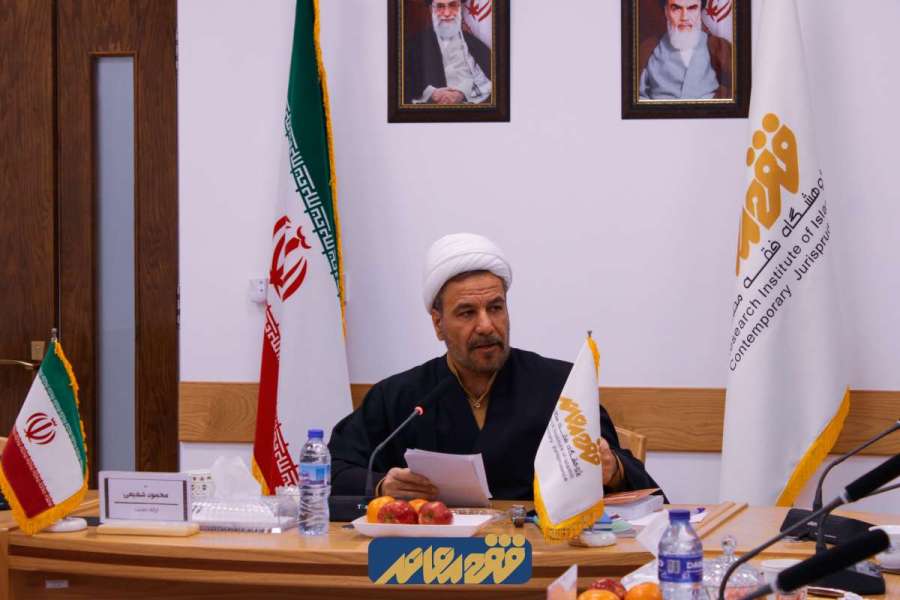
The next meeting “The role of reason in political jurisprudence” was held on Sunday, Jan. 10, 2024 at the Research Institute of Contemporary Jurisprudence. In this Hujjat al-Islam meeting, Dr. Mahmud Shafi’i expressed his opinions as a theory presenter.
Regarding the separation of three types of intellect, he considered an intellect to be an independent intellect, which is the rational and logical intellect, and concluded that based on this, the Shari’ah seeks to obtain the rules of religion within the framework of rationality. He added that the meaning of Shari’ah in this context is not only the teachings of the Qur’an, but what is included in the preserved tablet, and the ruling of reason here means the understanding of the Shari’ah ruling, not that the reason is the direct issuer of the ruling.
He emphasized that this intellect is not very important in the framework of Shi’ah thought, and basically from a philosophical point of view, intellect is the proof of general matters and not of particular matters, and therefore, in practice, it cannot serve jurisprudence. In the texts of scholars of the past, Martyr Sadr specifies this issue.
From the point of view of Hujjat al-Islam Shafi’i, if we combine reason with Mu’tazilites discourse, it can be a way forward for us. The most important point that has been noticed in the Mu’tazili intellect is that the Mu’tazilites combine this philosophical reasoning with experience.
The second type of intelligence mentioned by Dr. Shafi’i was the rationality of ijtihad, which may help us in understanding the Shari’ah from its sources; It means the same method of ijtihad.
Dr. Shafi’i said: In my idea, in the process of ijtihad, we should distance ourselves from the assumption that all meaning lies in the words of Shari’ah and pay attention to the contexts of text production. Among them, the discussion of the purposes of the Shari’ah, which may be interpreted as the purposes of the Shari’ah. From this point of view, in the framework of contextual hermeneutics, two practical fields, that is history and culture, and ideological fields, i.e. the conventional method of ijtihad based on the principles of current jurisprudence.
He added: For instance, in the discussion of the ruler’s consultation, many letters have been produced stating that from the verse “wa shawurhum fi al-amr” is understood as obligatory or desirable? If we expand our view from this single sentence to all related sentences and doctrines, we may understand the necessity of governance based on collective wisdom.
As for the third type of intellect that was mentioned in Dr. Shafi’i’s statement was extra-religious intellect in favor of religion which is a reason that is not in the realm of religion, but in the realm of human experience and analysis, and the wisdom that is made and discussed in the form of human sciences today.
From Dr. Shafi’i’s point of view, this point of view can be supported by the framework of religious thought and ijtihads by relying on the discussion of the authenticity of adultery. Dr. Shafi’i says: I raised the issue of obscenity at three different levels; First: the five jurisprudential rulings. This is not what I mean by the “lbaha”; Because this is within the scope of Shari’ah law and does not take us outside of it. Second: “lbaha” in the principles of jurisprudence, which is considered as acquittal in the principles of practice. Third: The third argument, which according to Imam Khumayni and a number of other jurists, is a theological debate. That is, just as God created man different from other creatures with the blessing of free will and the possibility of choice during creation, did he leave man free from duties during the legislation or does he face a set of duties everywhere?
He added: In contrast to this “lbaha”, it is a warning that it is the same as what the Mu’tazilites say; And although the jurists have raised this principle, they have not paid attention to its results.
He emphasized: Where there is an explicit Shari’ah ruling like usury, even if human experience agrees with it, it should be abandoned. Some cases are also silent in Shari’ah, such as the contracts that are discussed today and a Shari’ah format has been cast for it. But there are some things that are basically not clear to humans. From Dr. Shafi’i’s point of view, communication ijtihad should be sought here; It means that religious and non-religious experts enter the discussion and issues are raised and we reach a temporary decision.
As an instant, he pointed out: For example, there are those who believe that the hijab issue is not religious and consider it a customary matter; And some people consider it completely religious. In communication ijtihad, every thinker who has something to say, puts forth his opinion, and whoever was able to gain superiority in the presence of collective reason, his opinion is temporarily set as a standard.
He explained: This theory is derived from the theory of communicative action and we should seek to build a theory based on it.
In the continuation of this meeting, the critics criticized Dr. Shafi’i’s statements
.
